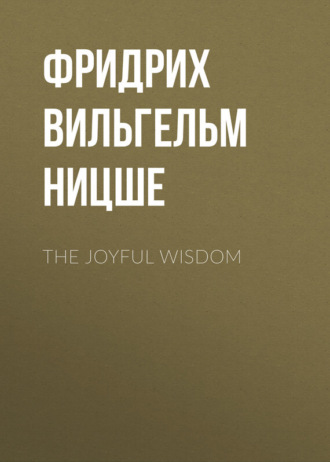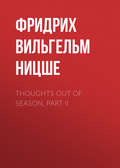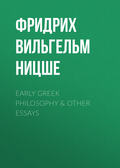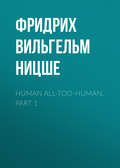
Фридрих Вильгельм Ницше
The Joyful Wisdom
31
Commerce and Nobility.– Buying and selling is now regarded as something ordinary, like the art of reading and writing; everyone is now trained to it even when he is not a tradesman exercising himself daily in the art; precisely as formerly in the period of uncivilised humanity, everyone was a hunter and exercised himself day by day in the art of hunting. Hunting was then something common: but just as this finally became a privilege of the powerful and noble, and thereby lost the character of the commonplace and the ordinary – by ceasing to be necessary and by becoming an affair of fancy and luxury, – so it might become the same some day with buying and selling. Conditions of society are imaginable in which there will be no selling and buying, and in which the necessity for this art will become quite lost; perhaps it may then happen that individuals who are less subjected to the law of the prevailing condition of things will indulge in buying and selling as a luxury of sentiment. It is then only that commerce would acquire nobility, and the noble would then perhaps occupy themselves just as readily with commerce as they have done hitherto with war and politics: while on the other hand the valuation of politics might then have entirely altered. Already even politics ceases to be the business of a gentleman; and it is possible that one day it may be found to be so vulgar as to be brought, like all party literature and daily literature, under the rubric: "Prostitution of the intellect."
32
Undesirable Disciples.– What shall I do with these two youths! called out a philosopher dejectedly, who "corrupted" youths, as Socrates had once corrupted them, – they are unwelcome disciples to me. One of them cannot say "Nay," and the other says "Half and half" to everything. Provided they grasped my doctrine, the former would suffer too much, for my mode of thinking requires a martial soul, willingness to cause pain, delight in denying, and a hard skin, – he would succumb by open wounds and internal injuries. And the other will choose the mediocre in everything he represents, and thus make a mediocrity of the whole, – I should like my enemy to have such a disciple.
33
Outside the Lecture-room.– "In order to prove that man after all belongs to the good-natured animals, I would remind you how credulous he has been for so long a time. It is now only, quite late, and after an immense self-conquest, that he has become a distrustful animal, – yes! man is now more wicked than ever." – I do not understand this; why should man now be more distrustful and more wicked? – "Because now he has science, – because he needs to have it!" —
34
Historia abscondita.– Every great man has a power which operates backward; all history is again placed on the scales on his account, and a thousand secrets of the past crawl out of their lurking-places – into his sunlight. There is absolutely no knowing what history may be some day. The past is still perhaps undiscovered in its essence! There is yet so much reinterpreting ability needed!
35
Heresy and Witchcraft.– To think otherwise than is customary – that is by no means so much the activity of a better intellect, as the activity of strong, wicked inclinations, – severing, isolating, refractory, mischief-loving, malicious inclinations. Heresy is the counterpart of witchcraft, and is certainly just as little a merely harmless affair, or a thing worthy of honour in itself. Heretics and sorcerers are two kinds of bad men; they have it in common that they also feel themselves wicked; their unconquerable delight is to attack and injure whatever rules, – whether it be men or opinions. The Reformation, a kind of duplication of the spirit of the Middle Ages at a time when it had no longer a good conscience, produced both of these kinds of people in the greatest profusion.
36
Last Words.-It will be recollected that the Emperor Augustus, that terrible man, who had himself as much in his own power and could be silent as well as any wise Socrates, became indiscreet about himself in his last words; for the first time he let his mask fall, when he gave to understand that he had carried a mask and played a comedy, – he had played the father of his country and wisdom on the throne well, even to the point of illusion! Plaudite amid, comœdia finita est! —The thought of the dying Nero: qualis artifex pereo! was also the thought of the dying Augustus: histrionic conceit! histrionic loquacity! And the very counterpart to the dying Socrates! – But Tiberius died silently, that most tortured of all self-torturers, —he was genuine and not a stage-player! What may have passed through his head in the end! Perhaps this: "Life – that is a long death. I am a fool, who shortened the lives of so many! Was I created for the purpose of being a benefactor? I should have given them eternal life: and then I could have seen them dying eternally. I had such good eyes for that: qualis spectator pereo!" When he seemed once more to regain his powers after a long death-struggle, it was considered advisable to smother him with pillows, – he died a double death.
37
Owing to three Errors.– Science has been furthered during recent centuries, partly because it was hoped that God's goodness and wisdom would be best understood therewith and thereby – the principal motive in the soul of great Englishmen (like Newton); partly because the absolute utility of knowledge was believed in, and especially the most intimate connection of morality, knowledge, and happiness – the principal motive in the soul of great Frenchmen (like Voltaire); and partly because it was thought that in science there was something unselfish, harmless, self-sufficing, lovable, and truly innocent to be had, in which the evil human impulses did not at all participate – the principal motive in the soul of Spinoza, who felt himself divine, as a knowing being: – it is consequently owing to three errors that science has been furthered.
38
Explosive People.– When one considers how ready are the forces of young men for discharge, one does not wonder at seeing them decide so uncritically and with so little selection for this or that cause: that which attracts them is the sight of eagerness for a cause, as it were the sight of the burning match – not the cause itself. The more ingenious seducers on that account operate by holding out the prospect of an explosion to such persons, and do not urge their cause by means of reasons; these powder-barrels are not won over by means of reasons!
39
Altered Taste.– The alteration of the general taste is more important than the alteration of opinions; opinions, with all their proving, refuting, and intellectual masquerade, are merely symptoms of altered taste, and are certainly not what they are still so often claimed to be, the causes of the altered taste. How does the general taste alter? By the fact of individuals, the powerful and influential persons, expressing and tyrannically enforcing without any feeling of shame, their hoc est ridiculum, hoc est absurdum; the decisions, therefore, of their taste and their disrelish: – they thereby lay a constraint upon many people, out of which there gradually grows a habituation for still more, and finally a necessity for all. The fact, however, that these individuals feel and "taste" differently, has usually its origin in a peculiarity of their mode of life, nourishment, or digestion, perhaps in a surplus or deficiency of the inorganic salts in their blood and brain, in short in their physis; they have, however, the courage to avow their physical constitution, and to lend an ear even to the most delicate tones of its requirements: their æsthetic and moral judgments are those "most delicate tones" of their physis.
40
The Lack of a noble Presence.– Soldiers and their leaders have always a much higher mode of comportment toward one another than workmen and their employers. At present at least, all militarily established civilisation still stands high above all so-called industrial civilisation; the latter, in its present form, is in general the meanest mode of existence that has ever been. It is simply the law of necessity that operates here: people want to live, and have to sell themselves; but they despise him who exploits their necessity and purchases the workman. It is curious that the subjection to powerful, fear-inspiring, and even dreadful individuals, to tyrants and leaders of armies, is not at all felt so painfully as the subjection to such undistinguished and uninteresting persons as the captains of industry; in the employer the workman usually sees merely a crafty, blood-sucking dog of a man, speculating on every necessity, whose name, form, character, and reputation are altogether indifferent to him. It is probable that the manufacturers and great magnates of commerce have hitherto lacked too much all those forms and attributes of a superior race, which alone make persons interesting; if they had had the nobility of the nobly-born in their looks and bearing, there would perhaps have been no socialism in the masses of the people. For these are really ready for slavery of every kind, provided that the superior class above them constantly shows itself legitimately superior, and born to command – by its noble presence! The commonest man feels that nobility is not to be improvised, and that it is his part to honour it as the fruit of protracted race-culture, – but the absence of superior presence, and the notorious vulgarity of manufacturers with red, fat hands, brings up the thought to him that it is only chance and fortune that has here elevated the one above the other; well then – so he reasons with himself – let us in our turn tempt chance and fortune! Let us in our turn throw the dice! – and socialism commences.
41
Against Remorse. —The thinker sees in his own actions attempts and questionings to obtain information about something or other; success and failure are answers to him first and foremost. To vex himself, however, because something does not succeed, or to feel remorse at all – he leaves that to those who act because they are commanded to do so, and expect to get a beating when their gracious master is not satisfied with the result.
42
Work and Ennui– In respect to seeking work for the sake of the pay, almost all men are alike at present in civilised countries; to all of them work is a means, and not itself the end; on which account they are not very select in the choice of the work, provided it yields an abundant profit. But still there are rarer men who would rather perish than work without delight in their labour: the fastidious people, difficult to satisfy, whose object is not served by an abundant profit, unless the work itself be the reward of all rewards. Artists and contemplative men of all kinds belong to this rare species of human beings; and also the idlers who spend their life in hunting and travelling, or in love-affairs and adventures. They all seek toil and trouble in so far as these are associated with pleasure, and they want the severest and hardest labour, if it be necessary. In other respects, however, they have a resolute indolence, even should impoverishment, dishonour, and danger to health and life be associated therewith. They are not so much afraid of ennui as of labour without pleasure; indeed they require much ennui, if their work is to succeed with them. For the thinker and for all inventive spirits ennui is the unpleasant "calm" of the soul which precedes the happy voyage and the dancing breezes; he must endure it, he must await the effect it has on him: – it is precisely this which lesser natures cannot at all experience! It is common to scare away ennui in every way, just as it is common to labour without pleasure. It perhaps distinguishes the Asiatics above the Europeans, that they are capable of a longer and profounder repose; even their narcotics operate slowly and require patience, in contrast to the obnoxious suddenness of the European poison, alcohol.
43
What the Laws Betray.– One makes a great mistake when one studies the penal laws of a people, as if they were an expression of its character; the laws do not betray what a people is, but what appears to them foreign, strange, monstrous, and outlandish. The laws concern themselves with the exceptions to the morality of custom; and the severest punishments fall on acts which conform to the customs of the neighbouring peoples. Thus among the Wahabites, there are only two mortal sins: having another God than the Wahabite God, and – smoking (it is designated by them as "the disgraceful kind of drinking"). "And how is it with regard to murder and adultery?" – asked the Englishman with astonishment on learning these things. "Well, God is gracious and pitiful!" answered the old chief. – Thus among the ancient Romans there was the idea that a woman could only sin mortally in two ways: by adultery on the one hand, and – by wine-drinking on the other. Old Cato pretended that kissing among relatives had only been made a custom in order to keep women in control on this point; a kiss meant: did her breath smell of wine? Wives had actually been punished by death who were surprised taking wine: and certainly not merely because women under the influence of wine sometimes unlearn altogether the art of saying No; the Romans were afraid above all things of the orgiastic and Dionysian spirit with which the women of Southern Europe at that time (when wine was still new in Europe) were sometimes visited, as by a monstrous foreignness which subverted the basis of Roman sentiments; it seemed to them treason against Rome, as the embodiment of foreignness.
44
The Believed Motive.– However important it may be to know the motives according to which mankind has really acted hitherto, perhaps the belief in this or that motive, and therefore that which mankind has assumed and imagined to be the actual mainspring of its activity hitherto, is something still more essential for the thinker to know. For the internal happiness and misery of men have always come to them through their belief in this or that motive, —not however, through that which was actually the motive! All about the latter has an interest of secondary rank.
45
Epicurus.– Yes, I am proud of perceiving the character of Epicurus differently from anyone else perhaps, and of enjoying the happiness of the afternoon of antiquity in all that I hear and read of him: – I see his eye gazing out on a broad whitish sea, over the shore-rocks on which the sunshine rests, while great and small creatures play in its light, secure and calm like this light and that eye itself. Such happiness could only have been devised by a chronic sufferer, the happiness of an eye before which the sea of existence has become calm, and which can no longer tire of gazing at the surface and at the variegated, tender, tremulous skin of this sea. Never previously was there such a moderation of voluptuousness.
46
Our Astonishment —There is a profound and fundamental satisfaction in the fact that science ascertains things that hold their ground, and again furnish the basis for new researches: – it could certainly be otherwise. Indeed, we are so much convinced of all the uncertainty and caprice of our judgments, and of the everlasting change of all human laws and conceptions, that we are really astonished how persistently the results of science hold their ground! In earlier times people knew nothing of this changeability of all human things; the custom of morality maintained the belief that the whole inner life of man was bound to iron necessity by eternal fetters: – perhaps people then felt a similar voluptuousness of astonishment when they listened to tales and fairy stories. The wonderful did so much good to those men, who might well get tired sometimes of the regular and the eternal. To leave the ground for once! To soar! To stray! To be mad! – that belonged to the paradise and the revelry of earlier times; while our felicity is like that of the shipwrecked man who has gone ashore, and places himself with both feet on the old, firm ground – in astonishment that it does not rock.
47
The Suppression of the Passions.– When one continually prohibits the expression of the passions as something to be left to the "vulgar," to coarser, bourgeois, and peasant natures – that is, when one does not want to suppress the passions themselves, but only their language and demeanour, one nevertheless realises therewith just what one does not want: the suppression of the passions themselves, or at least their weakening and alteration, – as the court of Louis XIV. (to cite the most instructive instance), and all that was dependent on it, experienced. The generation that followed, trained in suppressing their expression, no longer possessed the passions themselves, but had a pleasant, superficial, playful disposition in their place, – a generation which was so permeated with the incapacity to be ill-mannered, that even an injury was not taken and retaliated, except with courteous words. Perhaps our own time furnishes the most remarkable counterpart to this period: I see everywhere (in life, in the theatre, and not least in all that is written) satisfaction at all the coarser outbursts and gestures of passion; a certain convention of passionateness is now desired, – only not the passion itself! Nevertheless it will thereby be at last reached, and our posterity will have a genuine savagery, and not merely a formal savagery and unmannerliness.
48
Knowledge of Distress. —Perhaps there is nothing by which men and periods are so much separated from one another, as by the different degrees of knowledge of distress which they possess; distress of the soul as well as of the body. With respect to the latter, owing to lack of sufficient self-experience, we men of the present day (in spite of our deficiencies and infirmities), are perhaps all of us blunderers and visionaries in comparison with the men of the age of fear – the longest of all ages, – when the individual had to protect himself against violence, and for that purpose had to be a man of violence himself. At that time a man went through a long schooling of corporeal tortures and privations, and found even in a certain kind of cruelty toward himself, in a voluntary use of pain, a necessary means for his preservation; at that time a person trained his environment to the endurance of pain; at that time a person willingly inflicted pain, and saw the most frightful things of this kind happen to others without having any other feeling than for his own security. As regards the distress of the soul however, I now look at every man with respect to whether he knows it by experience or by description; whether he still regards it as necessary to simulate this knowledge, perhaps as an indication of more refined culture; or whether, at the bottom of his heart, he does not at all believe in great sorrows of soul, and at the naming of them calls to mind a similar experience as at the naming of great corporeal sufferings, such as tooth-aches, and stomach-aches. It is thus, however, that it seems to be with most people at present. Owing to the universal inexperience of both kinds of pain, and the comparative rarity of the spectacle of a sufferer, an important consequence results: people now hate pain far more than earlier man did, and calumniate it worse than ever; indeed people nowadays can hardly endure the thought of pain, and make out of it an affair of conscience and a reproach to collective existence. The appearance of pessimistic philosophies is not at all the sign of great and dreadful miseries; for these interrogative marks regarding the worth of life appear in periods when the refinement and alleviation of existence already deem the unavoidable gnat-stings of the soul and body as altogether too bloody and wicked; and in the poverty of actual experiences of pain, would now like to make painful general ideas appear as suffering of the worst kind. – There might indeed be a remedy for pessimistic philosophies and the excessive sensibility which seems to me the real "distress of the present": – but perhaps this remedy already sounds too cruel, and would itself be reckoned among the symptoms owing to which people at present conclude that "existence is something evil." Well! the remedy for "the distress" is distress.
49
Magnanimity and allied Qualities. —Those paradoxical phenomena, such as the sudden coldness in the demeanour of good-natured men, the humour of the melancholy, and above all magnanimity, as a sudden renunciation of revenge or of the gratification of envy – appear in men in whom there is a powerful inner impulsiveness, in men of sudden satiety and sudden disgust. Their satisfactions are so rapid and violent that satiety, aversion and flight into the antithetical taste, immediately follow upon them: in this contrast the convulsion of feeling liberates itself, in one person by sudden coldness, in another by laughter, and in a third by tear and self-sacrifice. The magnanimous person appears to me – at least that kind of magnanimous person who has always made most impression – as a man with the strongest thirst for vengeance, to whom a gratification presents itself close at hand, and who already drinks it off in imagination so copiously, thoroughly, and to the last drop, that an excessive, rapid disgust follows this rapid licentiousness; – he now elevates himself "above himself," as one says, and forgives his enemy, yea, blesses and honours him. With this violence done to himself, however, with this mockery of his impulse to revenge, even still so powerful he merely yields to the new impulse, the disgust which has become powerful, and does this just as impatiently and licentiously, as a short time previously he forestalled, and as it were exhausted, the joy of revenge with his fantasy. In magnanimity there is the same amount of egoism as in revenge, but a different quality of egoism.
50
The Argument of Isolation.– The reproach of conscience, even in the most conscientious, is weak against the feeling: "This and that are contrary to the good morals of your society." A cold glance or a wry mouth on the part of those among whom and for whom one has been educated, is still feared even by the strongest. What is really feared there? Isolation! as the argument which demolishes even the best arguments for a person or cause! – It is thus that the gregarious instinct speaks in us.
51
Sense for Truth. —Commend me to all scepticism where I am permitted to answer: "Let us put it to the test!" But I don't wish to hear anything more of things and questions which do not admit of being tested. That is the limit of my "sense for truth": for bravery has there lost its right.
52
What others Know of us. —That which we know of ourselves and have in our memory is not so decisive for the happiness of our life as is generally believed. One day it flashes upon our mind what others know of us (or think they know) – and then we acknowledge that it is the more powerful. We get on with our bad conscience more easily than with our bad reputation.
53
Where Goodness Begins. —Where bad eyesight can no longer see the evil impulse as such, on account of its refinement, – there man sets up the kingdom of goodness; and the feeling of having now gone over into the kingdom of goodness brings all those impulses (such as the feelings of security, of comfortableness, of benevolence) into simultaneous activity, which were threatened and confined by the evil impulses. Consequently, the duller the eye so much the further does goodness extend! Hence the eternal cheerfulness of the populace and of children! Hence the gloominess and grief (allied to the bad conscience) of great thinkers.
54
The Consciousness of Appearance. —How wonderfully and novelly, and at the same time how awfully and ironically, do I feel myself situated with respect to collective existence, with my knowledge! I have discovered for myself that the old humanity and animality, yea, the collective primeval age, and the past of all sentient being, continues to meditate, love, hate, and reason in me, – I have suddenly awoke in the midst of this dream, but merely to the consciousness that I just dream, and that I must dream on in order not to perish; just as the sleep-walker must dream on in order not to tumble down. What is it that is now "appearance" to me! Verily, not the antithesis of any kind of essence, – what knowledge can I assert of any kind of essence whatsoever, except merely the predicates of its appearance! Verily not a dead mask which one could put upon an unknown X, and which to be sure one could also remove! Appearance is for me the operating and living thing itself; which goes so far in its self-mockery as to make me feel that here there is appearance, and Will o' the Wisp, and spirit-dance, and nothing more, – that among all these dreamers, I also, the "thinker," dance my dance, that the thinker is a means of prolonging further the terrestrial dance, and in so far is one of the masters of ceremony of existence, and that the sublime consistency and connectedness of all branches of knowledge is perhaps, and will perhaps, be the best means for maintaining the universality of the dreaming, the complete, mutual understandability of all those dreamers, and thereby the duration of the dream.
55
The Ultimate Nobility of Character.– What then makes a person "noble"? Certainly not that he makes sacrifices; even the frantic libertine makes sacrifices. Certainly not that he generally follows his passions; there are contemptible passions. Certainly not that he does something for others, and without selfishness; perhaps the effect of selfishness is precisely at its greatest in the noblest persons. – But that the passion which seizes the noble man is a peculiarity, without his knowing that it is so: the use of a rare and singular measuring-rod, almost a frenzy: the feeling of heat in things which feel cold to all other persons: a divining of values for which scales have not yet been invented: a sacrificing on altars which are consecrated to an unknown God: a bravery without the desire for honour: a self-sufficiency which has superabundance, and imparts to men and things. Hitherto, therefore, it has been the rare in man, and the unconsciousness of this rareness, that has made men noble. Here, however, let us consider that everything ordinary, immediate, and indispensable, in short, what has been most preservative of the species, and generally the rule in mankind hitherto, has been judged unreasonable and calumniated in its entirety by this standard, in favour of the exceptions. To become the advocate of the rule – that may perhaps be: the ultimate form and refinement in which nobility of character will reveal itself on earth.
56
The Desire for Suffering.– When I think of the desire to do something, how it continually tickles and stimulates millions of young Europeans, who cannot endure themselves and all their ennui, – I conceive that there must be a desire in them to suffer something, in order to derive from their suffering a worthy motive for acting, for doing something. Distress is necessary! Hence the cry of the politicians, hence the many false trumped-up, exaggerated "states of distress" of all possible kinds, and the blind readiness to believe in them. This young world desires that there should arrive or appear from the outside – not happiness – but misfortune; and their imagination is already busy beforehand to form a monster out of it, so that they may afterwards be able to fight with a monster. If these distress-seekers felt the power to benefit themselves, to do something for themselves from internal sources, they would also understand how to create a distress of their own, specially their own, from internal sources. Their inventions might then be more refined, and their gratifications might sound like good music: while at present they fill the world with their cries of distress, and consequently too often with the feeling of distress in the first place! They do not know what to make of themselves – and so they paint the misfortune of others on the wall; they always need others! And always again other others! – Pardon me, my friends, I have ventured to paint my happiness on the wall.







